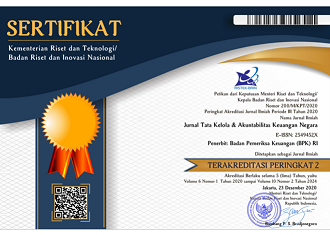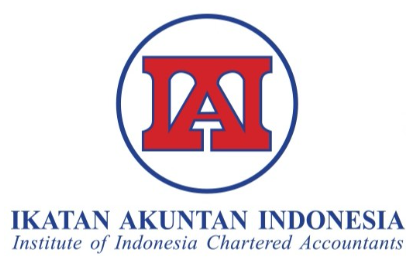The Effect of Skepticism, Time Pressure, and Remote Audit During the COVID-19 Pandemic on Audit Quality: A Study of Auditors’ Perception
DOI:
https://doi.org/10.28986/jtaken.v8i1.914Keywords:
Audit Quality, Remote Audit, Skepticism, Time Pressure, COVID-19Abstract
This study aimed to determine the impact of professional skepticism, audit time pressure, and remote audit during the COVID-19 pandemic on audit quality and the effect of remote audits on the relationship between professional skepticism and audit quality. The study was conducted through a questionnaire survey to The Audit Board of The Republic of Indonesia (BPK RI) auditors and analyzed using Smart PLS quantitative analysis methods. The results showed that professional skepticism, audit time pressure, and remote audit affected audit quality. Meanwhile, the remote audit does not moderate the relationship between professional skepticism and audit quality, classified as predictor moderation.
References
Akrimi, N. (2020). The impact of Coronavirus pandemic on audit quality: The perceptions of Saudi auditors. Academy of Accounting and Financial Studies Journal, 25(1), 1-7.
Albitar, K., Gerged, A. M., Kikhia, H., & Hussainey, K. (2020). Auditing in times of social distancing: The effect of COVID-19 on auditing quality. International Journal of Accounting and Information Management, 29(1), 169–178. DOI: 10.1108/IJAIM-08-2020-0128
Amiruddin, A. (2019). Mediating effect of work stress on the influence of time pressure, work-family conflict, and role ambiguity on audit quality reduction behavior. International Journal of Law and Management, 61(2), 434–454. DOI: 10.1108/IJLMA-09-2017-0223
Appelbaum, D., Budnik, S., & Vasarhelyi, M. (2020). Auditing and accounting during and after the COVID-19 crisis. The CPA Journal, 90(6), 14–19.
Arens, A. A., Elder, R. J., & Beasley, M. S. (2014). Auditing and assurance services (Fifteenth Ed.). England: Pearson Education, Inc.
Arisinta, O. (2013). Pengaruh kompetensi, independensi, profesionalisme dan time budget pressure terhadap kualitas audit. Jurnal Akuntansi & Manajemen, XXIII(3), 266–278.
Asmara, R. Y. (2019). Effect of complexity, due professional care, and auditor ethics on audit quality. International Journal of Multidisciplinary Research, 5(12), 18–25.
BPK RI. (2017). BPK Regulation Number 1 Year 2017 concerning State Financial Audit Standards (Peraturan BPK RI Nomor 1 Tahun 2017 tentang Standar Pemeriksaan Keuangan Negara). Retrieved from https://www.bpk.go.id/ page/standar-pemeriksaan-keuangan -negara
Beasley, M. S., Carcello, J. V, & Hermanson, D. R. (2001). Top 10 audit deficiencies. Journal of Accountancy, 191(4), 63–66.
Belzunegui-Eraso, A., & Erro-Garcés, A. (2020). Teleworking in the context of the Covid-19 crisis. Sustainability, 12(9). DOI: 10.3390/su12093662
Bierstaker, J. L., Burnaby, P., & Thibodeau, J. (2001). The impact of information technology on the audit process: an assessment of state of the art and implications for the future. Managerial Auditing Journal, 16(3), 159.
Bowrin, A. R., & King, J. (2010). Time pressure, task complexity, and audit effectiveness. Managerial Auditing Journal, 25(2), 160–181. DOI: 10.1108/02686901011008963
Boyle, D. M., & Carpenter, B. W. (2015). Demonstrating professional skepticism. CPA Journal, 85(3), 31–35.
Butarbutar, T. E., & Pesak, P. J. (2021). Pengaruh work from home dan independensi terhadap kualitas audit internal aparat inspektorat dalam pengawasan keuangan daerah Kota Manado selama masa pandemi (Studi empiris pada Inspektorat Kota Manado). Jurnal Riset Akuntansi dan Auditing “Goodwill”, 12(2), 366-376.
Castka, P., Searcy, C., & Fischer, S. (2020). Technology-enhanced auditing in voluntary sustainability standards: The impact of COVID-19. Sustainability, 12(11), 1–25. DOI: 10.3390/su12114740
Chiang, C. (2016). Conceptualizing the linkage between professional skepticism and auditor independence. Pacific Accounting Review, 28(2), 180–200. DOI: 10.1108/PAR-08-2015-0034
Coram, P., Ng, J., & Woodliff, D. (2003). A survey of time budget pressure and reduced audit quality among Australian auditors. Australian Accounting Review, 13(29), 38–44. DOI: 10.1111/j.1835-2561.2003.tb00218.x
Coram, P., Ng, J., & Woodliff, D. R. (2004). The effect of risk of the misstatement on the propensity to commit reduced audit quality acts under time budget pressure. Auditing, 23(2), 159–167. DOI: 10.2308/aud.2004.23.2.159
De Villiers, C., & Hisao, P. C. K. (2018). Why organizations voluntarily report – Agency theory. In C. De Villiers & W. Maroun (Eds.), Sustainability Accounting and Integrated Reporting. New York: Routledge.
DeAngelo, L. E. (1981). Auditor size and audit quality. Journal of Accounting and Economics, 3(3), 183–199. DOI: 10.1016/0165-4101(81)90002-1
Deviani, T., & Badera, I. D. N. (2017). Sistem informasi sebagai pemoderasi pengaruh kompleksitas audit dan time budget pressure terhadap kualitas audit. E-Jurnal Akuntansi, 18(2), 1171–1201.
Diab, A. (2021). The implications of the COVID-19 Pandemic for the auditing and assurance processes. Journal of Legal, Ethical and Regulatory Issues, 24, 1-8.
Dwidienawati, D., Tjahjana, D., Pradipto, Y. D., & Gandasari, D. (2020). Is your work-from-home job satisfying? Lesson learned from work from home during COVID-19 outbreak in Indonesia. Journal of the Social Sciences, 48(4), 1189-1201.
Eni, L. C. (2016). Considerations regarding the design of an online collaborative audit system. Managerial Auditing Journal, 31(1), 64–86. DOI: 10.1108/MAJ-01-2014-0984
Ghozali, I. (2021). Partial least square, konsep, teknik, dan aplikasi menggunakan program SmartPLS 3.2.9 untuk penelitian empiris. (Edisi 3). Badan Penerbit Universitas Diponegoro.
Gundry, L. C., & Liyanarachchi, G. A. (2007). Time budget pressure, auditors’ personality type, and the incidence of reduced audit quality practices. Pacific Accounting Review, 19(2), 125–152. DOI: 10.1108/01140580710819898
Hu, D. (2015). Audit quality and measurement: Towards a comprehensive understanding. Academy of Accounting and Financial Studies Journal, 19(1), 209–222.
Hussin, S. A. H. S., Iskandar, T. M., Saleh, N. M., & Jaffar, R. (2017). Professional skepticism and auditors’ assessment of misstatement risks: The moderating effect of experience and time budget pressure. Economics and Sociology, 10(4), 225–250. DOI: 10.14254/2071-789X.2017/10-4/17
Institut Akuntan Publik Indonesia (IAPI). (2018). Keputusan Dewan Pengurus Nomor 4 Tahun 2018 tentang Panduan indikator kualitas audit pada kantor akuntan publik. In Standar Profesional Akuntan Publik. IAPI.
Institut Akuntan Publik Indonesia (IAPI). (2020, April). Respons auditor atas pandemi COVID-19: Terhadap laporan keuangan, prosedur audit, dan pertimbangan praktis penunjang kualitas audit. Technical Newflash Institut Akuntan Publik Indonesia.
International Accreditation Forum (IAF). (2015). Principles on remote assessment: IAF ID 12:2015. International Accreditation Forum.
International Organization for Standardization (ISO). (2018). International Standard: Guidelines for auditing management systems (Third). ISO 19011.
Johnstone, K. M., Gramling, A. A., & L.E. Rittenberg. (2016). Auditing: A risk-based approach to conducting a quality audit (Tenth Ed.). Boston: Cengage Learning.
Kelly, T., & Cook, E. (1991). An international comparison of audit time-budget pressures. The Woman CPA. DOI: 10.1016/j.jaci.2012.05.050
Knechel, W. R., & Shefchik, L. B. (2014). Audit quality in The Routledge companion to auditing (D. Hay, W. R. Knechel, & M. Willekens (eds.)). New York: Routledge.
Kusumawati, A., & Syamsuddin, S. (2018). The effect of auditor quality on professional skepticism and its relationship to audit quality. International Journal of Law and Management, 60(4), 998–1008. DOI: 10.1108/IJLMA-03-2017-0062
Lee, H. (2012). Incentive contracts and time pressure on audit judgment performance. Managerial Auditing Journal, 27(3), 263–283. DOI: 10.1108/02686901211207492
Lee, L., Whitworth, J., & Hermanson, S. (2015). The effects of information technology innovativeness on audit efficiencies. Review of Business Information Systems, 19(1), 25.
Lee, S. C., Su, J. M., Tsai, S. B., Lu, T. L., & Dong, W. (2016). A comprehensive survey of government auditors’ self-efficacy and professional development for improving audit quality. SpringerPlus, 5(1), 1–25. DOI: 10.1186/s40064-016-2903-0
Levy, H. B. (2020). Financial reporting and auditing implications of the COVID-19 Pandemic. CPA Journal, 90(5), 26–33.
Litzenberg, R., & Ramirez, C. F. (2020). Proses audit jarak jauh selama dan setelah COVID-19: implikasi jangka pendek dan panjang. In The Institute of Internal Auditor: Vol. Issue, pp. 2–9). The Institute of Internal Auditors, Inc. Retrieved From https://na.theiia.org/translations/PublicDocuments/EHSKB-Remote-Auditing-for-COVID-19-and-Beyond-Indonesian.pdf
Meidawati, N., & Assidiqi, A. (2019). The influences of audit fees, competence, independence, auditor ethics, and time budget pressure on audit quality. Jurnal Akuntansi & Auditing Indonesia, 23(2), 117–128. DOI: 10.20885/jaai.vol23.iss2.art6
Messier, W. F., Glover, S. M., & Prawitt, D. F. (2006). Auditing and assurance services: A systematic approach (Fourth Ed.). New York: McGraw-Hill.
Mungkasa, O. (2020). Bekerja dari rumah (Working From Home/WFH): Menuju tatanan baru era pandemi COVID 19. Jurnal Perencanaan Pembangunan: The Indonesian Journal of Development Planning, 4(2), 126–150. DOI: 10.36574/jpp.v4i2.119
Nandari, A. W. S., & Latrini, M. Y. (2015). Pengaruh sikap skeptis, independensi, penerapan kode etik, dan akuntabilitas terhadap kualitas audit. E-Jurnal Akuntansi, 10(1), 164–181.
Nastase, P., & Ionescu, C. (2011). The impact of teleworking on the audit mission. Journal of Accounting and Management Information Systems, 10(3), 424–436.
Nitzl, C. (2016). The use of partial least squares structural equation modeling (PLS-SEM) in management accounting research: Directions for future theory development. Journal of Accounting Literature, 37, 19–35. DOI: 10.1016/j.acclit.2016.09.003
Nugrahaeni, S., Samin, S., & Nopiyanti, A. (2019). Pengaruh skeptisisme profesional auditor, kompetensi, independensi dan kompleksitas audit terhadap kualitas audit. Equity, 21(2), 181. DOI: 10.34209/equ.v21i2.643
Nugroho, L. (2018). Analisa faktor-faktor yang mempengaruhi kualitas audit (studi empiris pada perusahaan manufaktur industri sektor barang konsumsi yang terdaftar di Bursa Efek Indonesia tahun 2014-2016). Jurnal Maneksi, 7(1), 55. DOI: 10.31959/jm.v7i1.89
Pasupati, B., & Husain, T. (2020). COVID-19 Pandemic: Audit delay and reporting in Indonesian. Research Inventy: International Journal of Engineering And Science, 10(11), 2319–6483.
Peytcheva, M. (2014). Professional skepticism and auditor cognitive performance in a hypothesis-testing task. Managerial Auditing Journal, 29(1), 27–49. DOI: 10.1108/MAJ-04-2013-0852
Pinello, A. S., Volkan, A. G., Franklin, J., Levatino, M., & Tiernan, K. (2019). The PCAOB Audit Quality Indicator Framework Project: Feedback From Stakeholders. Journal of Business & Economics Research (JBER), 16(1), 1–8. DOI: 10.19030/jber.v16i1.10280
Popova, V. (2013). Exploration of skepticism, client-specific experiences, and audit judgments. Managerial Auditing Journal, 28(2), 140–160. DOI: 10.1108/02686901311284540
Porter, B., Simon, J., & Hatherly, D. (2008). Principles of external audit (Third Ed.). United Kingdom: John Wiley & Sons, Inc.
Santoso, Y. N. P., & Achmad, T. (2019). Pengaruh audit tenure, audit fee, tekanan waktu, tekanan klien dan kompleksitas tugas terhadap kualitas audit pada KAP Semarang. Diponegoro Journal of Accounting, 8(4), 1–10.
Sari, E. N., & Lestari, S. (2018). Pengaruh kompetensi dan time budget pressure terhadap kualitas audit pada BPK RI Perwakilan Provinsi Sumatera Utara. Jurnal Riset Akuntansi Dan Keuangan, 6(1), 81–92. DOI: 10.17509/jrak.v6i1.11280
Sugiyono. (2017). Metode Penelitian Kombinasi. Bandung: Alfabeta.
Suwandi, D. E. (2021). Kualitas audit perusahaan pada masa pandemic COVID 19 (Studi Literatur). Jurnal Akuntansi Keuangan dan Bisnis, 14(1).
Svanberg, J., & Öhman, P. (2013). Auditors’ time pressure: Does ethical culture support audit quality? Managerial Auditing Journal, 28(7), 572–591. DOI: 10.1108/MAJ-10-2012-0761
Teeter, R. A., Alles, M. G., & Vasarhelyi, M. A. (2010). The remote audit. Journal of Emerging Technologies in Accounting, 7(1), 73–88. DOI: 10.2308/jeta.2010.7.1.73
The Center for Audit Quality. (2014). CAQ Approach to Audit Quality Indicators. Retrieved from https://www.thecaq.org/wp-content/uploads/2019/03/caq-approach-to-audit-quality-indicators-april-2014.pdf
Tjun Tjun, L., Marpaung, E. I., & Setiawan, S. (2012). Pengaruh kompetensi dan independensi auditor terhadap kualitas audit. Jurnal Akuntansi, 4(1), 33–56. DOI: 10.1177/1753193416664491
Tuanakotta, T. M. (2011). Berpikir kritis dalam auditing. Jakarta: Salemba Empat.
Umar, M., Sitorus, S. M., Surya, R. L., Shauki, E. R., & Diyanti, V. (2017). Pressure, dysfunctional behavior, fraud detection, and role of information technology in the audit process. Australasian Accounting, Business and Finance Journal, 11(4), 102–115. DOI: 10.14453/aabfj.v11i4.8
Wijaya, I. A., & Yulyona, M. T. (2017). Does the complexity of audit tasks, time deadline pressure, obedience pressure, and information system expertise improve audit quality? International Journal of Economics and Financial Issues, 7(3), 398–403.
Downloads
Submitted
Accepted
Published
How to Cite
Issue
Section
License

Jurnal Tata Kelola dan Akuntabilitas Keuangan Negara is licensed under
a Creative Commons Attribution-ShareAlike 4.0 International License




















